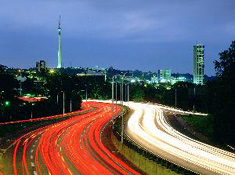SA's credit ratings: upgrade #3
26 August 2005
Fitch Ratings has become the third major international agency to upgrade South Africa's sovereign credit ratings in 2005, following upgrades by Moody's and Standard & Poor's.
A better economic growth performance, stronger external balance sheet, entrenched macro-economic stability, increased public investment and transparent political system were among the reasons cited by the agencies for their upgrades.
On Thursday, Fitch raised South Africa's long-term foreign currency rating from BBB to BBB+, its short-term rating from F3 to F2, and its country ceiling from BBB+ to A-.
Earlier in August, Standard & Poor's upgraded SA's long-term foreign currency rating from BBB to BBB+ and its local currency rating from A to A+.
And in January, Moody's lifted SA's country ceilings for foreign currency debt and bank deposits from Baa2 to Baa1, with a stable outlook. Ratings on foreign currency-denominated bonds and notes was also raised to Baa1, with a stable outlook.
Sovereign credit ratings are a measure of a government's creditworthiness, with higher ratings implying less risk for investors, effectively making it cheaper for a country and its companies to borrow on local and international capital markets.
SA's foreign currency rating is now three levels above the entry-level investment grade rating - on a par with Poland and Thailand, and within a notch of countries like China, Hungary and the Czech Republic.
"The upgrade reflects an improvement in South Africa's growth performance and a further strengthening of its external balance sheet, resulting from a sizeable build-up of official reserves," Fitch said in a statement.
Veronica Kalema, Fitch's lead analyst on South Africa, told radio station Classic FM that the country's recent growth performance had exceeded expectations. "This time [in 2004] expected growth was 3% to 3.5% over the medium-term. Now it's more like 4% over the medium term," Kalema said.
Standard & Poor's said at the time of its upgrade that it was supported by the country's "prudent macroeconomic policies, a moderate debt burden, and strong and stable political institutions."
Record economic upswing
South Africa's economy has been in an upward phase of the business cycle since September 1999 - the longest period of economic expansion in the country's recorded history.
During this upswing - from September 1999 through to June 2005 - the annual economic growth rate averaged 3.5%. In the decade prior to 1994, economic growth averaged less than 1% a year.
According to the South African Reserve Bank, there is no sign of this period of expansion coming to an end. Gross domestic product (GDP) growth was running at an annualised 4.8% in the second quarter of 2005 (compared to 3.7% in 2004 and 2.8% in 2003).
On Thursday, Fitch said it expected that South Africa would be a net external creditor by the end of 2006, ie that the country's reserves and liquid foreign assets held by banks would more than cover its gross external debt.
The SA Reserve Bank's gross gold and forex reserves stood at US$18.9-billion at 31 July, more than twice its $8-billion reserves at the end of 2003.
Fitch also stated that the country had managed black economic empowerment "without any serious disruptions to the economy thus far, and has contributed to the growing black middle class and thus to economic growth and social stability."
Areas of vulnerability
However, the agency said it was concerned about SA's widening current account deficit - projected at over 3.5% of gross domestic product (GDP) in the medium term - adding that additional structural reform, including labour market reform and better education and training, were needed to boost investment and alleviate socio-economic problems including high unemployment, income inequality and
HIV/Aids.
In July, Deputy President Phumzile Mlambo-Ngcuka was appointed head of a task team to explore ways in which South Africa could achieve a higher growth rate and develop a programme for boosting investment in the economy.
National Treasury director-general Lesetja Kganyago told Business Day that the clear message from all three ratings agencies was that South Africa has "got to focus on reducing poverty and unemployment, to ensure sustained long-term stability."
SouthAfrica.info reporter














